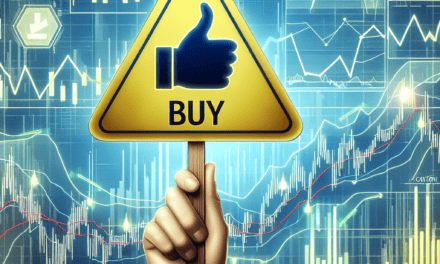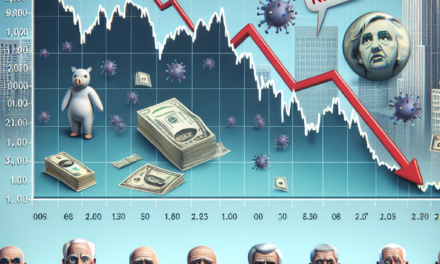“GameStop: A High-Stakes Play in the Evolving Retail Landscape.”
Introduction
Investing in GameStop (NYSE:GME) has been a topic of intense debate and interest among investors, financial analysts, and market enthusiasts. The company, traditionally known as a brick-and-mortar video game retailer, gained unprecedented attention in early 2021 due to a highly publicized short squeeze driven by retail investors on platforms like Reddit. This event led to significant volatility in GameStop’s stock price, drawing both speculative traders and long-term investors into the fray. As the company attempts to pivot its business model towards e-commerce and digital gaming, potential investors are left to weigh the risks and rewards of investing in a stock that has become emblematic of market unpredictability. Key considerations include GameStop’s financial health, strategic initiatives, market trends in gaming and retail, and the broader economic environment. Understanding these factors is crucial for determining whether investing in GameStop is a prudent decision or a speculative gamble.
Historical Performance Of GameStop Stock
GameStop Corporation (NYSE:GME) has been a focal point of intense scrutiny and interest in the financial markets, particularly since the unprecedented events of early 2021. To understand whether investing in GameStop is a prudent decision, it is essential to examine the historical performance of its stock, which provides valuable insights into its volatility and potential future trajectory.
Initially, GameStop was a traditional brick-and-mortar retailer specializing in video games, consoles, and related accessories. For years, the company faced significant challenges due to the digital transformation of the gaming industry, which saw a shift towards online gaming and digital downloads. Consequently, GameStop’s stock performance reflected these struggles, with a steady decline in value as the company grappled with declining sales and store closures. However, the narrative surrounding GameStop took a dramatic turn in January 2021, when it became the epicenter of a historic short squeeze orchestrated by retail investors on platforms like Reddit’s WallStreetBets.
This event catapulted GameStop’s stock price from under $20 to an astonishing peak of over $480 within weeks, driven by a combination of short-covering and speculative buying. The stock’s meteoric rise was not rooted in the company’s fundamentals but rather in a collective effort by retail investors to challenge institutional short-sellers. This phenomenon highlighted the power of social media and retail investors in influencing stock prices, albeit temporarily. As a result, GameStop’s stock became emblematic of the so-called “meme stock” movement, characterized by extreme volatility and speculative trading.
Following the initial surge, GameStop’s stock price experienced significant fluctuations, with periods of rapid appreciation followed by sharp declines. This volatility was exacerbated by ongoing discussions about the company’s future direction and strategic initiatives. In response to the changing landscape, GameStop embarked on a transformation strategy, aiming to pivot towards e-commerce and digital services. The appointment of Ryan Cohen, co-founder of Chewy, as chairman of the board, signaled a commitment to revitalizing the company’s business model and exploring new growth opportunities.
Despite these efforts, GameStop’s stock performance remains unpredictable, influenced by both market sentiment and the company’s ability to execute its turnaround strategy. Investors considering GameStop must weigh the potential for future growth against the inherent risks associated with its volatile stock price. While the company’s strategic shift towards digital and e-commerce holds promise, it is not without challenges, as GameStop faces stiff competition from established players in the digital gaming space.
Moreover, the broader market environment, including interest rates, inflation, and consumer spending trends, can significantly impact GameStop’s stock performance. Investors should also consider the potential for regulatory scrutiny, as the events of 2021 have prompted increased attention from regulators regarding market manipulation and trading practices.
In conclusion, the historical performance of GameStop’s stock underscores its volatility and the speculative nature of its recent price movements. While the company’s efforts to transform its business model offer a glimmer of hope, the path to sustainable growth remains uncertain. Therefore, potential investors must carefully assess their risk tolerance and investment objectives before considering an investment in GameStop. As with any investment, thorough research and a clear understanding of the company’s fundamentals and market dynamics are crucial in making an informed decision.
Analyzing GameStop’s Current Market Position
In recent years, GameStop (NYSE:GME) has become a focal point of discussion among investors, financial analysts, and the general public. The company, once a dominant player in the video game retail industry, has experienced a tumultuous journey marked by significant market volatility and a dramatic shift in its business model. To determine whether investing in GameStop is a prudent decision, it is essential to analyze its current market position, taking into account both its recent performance and future prospects.
GameStop’s transformation began in earnest in early 2021, when it became the epicenter of a retail trading frenzy. This surge in interest was largely driven by a community of retail investors on social media platforms, who collectively pushed the stock price to unprecedented heights. While this phenomenon brought GameStop into the spotlight, it also raised questions about the sustainability of its stock valuation. Despite the initial excitement, the company’s fundamentals remained a critical factor in assessing its long-term viability.
In the wake of this market upheaval, GameStop has embarked on a strategic overhaul aimed at revitalizing its business model. Under the leadership of a new management team, the company has shifted its focus from traditional brick-and-mortar retail to a more diversified approach that includes e-commerce and digital initiatives. This pivot is intended to capitalize on the growing trend of online gaming and digital distribution, which has been accelerated by the global pandemic. By expanding its digital footprint, GameStop aims to capture a larger share of the gaming market and reduce its reliance on physical store sales.
Moreover, GameStop has made significant investments in technology and infrastructure to support its digital transformation. The company has enhanced its online platform, improved customer experience, and streamlined its supply chain operations. These efforts are designed to position GameStop as a competitive player in the rapidly evolving gaming industry. However, the success of these initiatives remains uncertain, as the company faces stiff competition from established digital platforms and gaming giants.
In addition to its strategic initiatives, GameStop’s financial health is a crucial consideration for potential investors. The company has made strides in improving its balance sheet by reducing debt and increasing liquidity. This financial stability provides GameStop with the flexibility to invest in growth opportunities and navigate potential challenges. Nevertheless, the company’s profitability remains a concern, as it continues to grapple with the transition from a traditional retail model to a digital-centric approach.
Furthermore, the broader economic environment and market conditions play a significant role in shaping GameStop’s future prospects. The gaming industry is poised for continued growth, driven by technological advancements and increasing consumer demand for interactive entertainment. However, macroeconomic factors such as inflation, interest rates, and consumer spending patterns could impact GameStop’s performance and stock valuation.
In conclusion, investing in GameStop presents both opportunities and risks. The company’s efforts to reinvent itself and adapt to the digital age are commendable, but the outcome of these initiatives is far from guaranteed. Potential investors must weigh the potential for growth against the inherent uncertainties and market volatility. As with any investment decision, thorough research and careful consideration of GameStop’s current market position and future trajectory are essential to making an informed choice.
The Impact Of Retail Investors On GameStop
The impact of retail investors on GameStop (NYSE:GME) has been a topic of significant interest and debate in the financial world. This phenomenon, which gained widespread attention in early 2021, has reshaped the landscape of stock market investing and raised questions about the influence of retail investors on traditionally institutional-dominated markets. To understand whether investing in GameStop is a smart move, it is crucial to examine the role retail investors have played in the company’s recent history and the broader implications of their involvement.
Retail investors, often characterized as individual, non-professional investors, have historically had limited influence on stock prices compared to institutional investors. However, the advent of online trading platforms and social media has empowered these individuals, allowing them to coordinate and execute trades on a scale previously unimaginable. The GameStop saga exemplifies this shift, as a collective of retail investors, primarily organized through platforms like Reddit’s WallStreetBets, orchestrated a short squeeze that sent GameStop’s stock price soaring from under $20 to over $400 in a matter of weeks. This unprecedented event highlighted the potential power of retail investors to disrupt market dynamics and challenge the status quo.
The impact of retail investors on GameStop extends beyond mere price fluctuations. Their involvement has prompted a reevaluation of market mechanisms, regulatory frameworks, and the ethical considerations surrounding stock trading. For instance, the dramatic rise in GameStop’s stock price led to significant losses for hedge funds that had heavily shorted the stock, sparking debates about the fairness and transparency of short selling practices. Additionally, the volatility induced by retail trading activity has raised concerns about market stability and the potential for systemic risks, prompting regulatory bodies to consider new measures to protect both investors and the broader financial system.
While the influence of retail investors on GameStop has been profound, it is essential to consider the sustainability of this impact when evaluating the company’s long-term investment potential. The surge in GameStop’s stock price was largely driven by speculative trading rather than fundamental improvements in the company’s business model or financial performance. As such, the stock remains highly volatile, with its value subject to rapid and unpredictable changes based on market sentiment and external factors. This volatility poses significant risks for investors, particularly those who may be swayed by the allure of quick profits without fully understanding the underlying dynamics at play.
Moreover, the broader implications of retail investor involvement in GameStop raise questions about the future of stock market investing. The democratization of trading has undoubtedly increased accessibility and participation, but it has also introduced new challenges related to investor education, market manipulation, and the potential for herd behavior. As retail investors continue to play a more prominent role in the market, it will be crucial for both regulators and market participants to adapt to this evolving landscape, ensuring that the benefits of increased participation are balanced with appropriate safeguards.
In conclusion, the impact of retail investors on GameStop has been transformative, highlighting both the potential and the challenges of a more democratized stock market. While the involvement of retail investors has reshaped the company’s stock trajectory, it also underscores the importance of careful consideration and due diligence when evaluating investment opportunities. As such, whether investing in GameStop is a smart move depends on one’s risk tolerance, investment strategy, and understanding of the complex factors at play in this unique market environment.
GameStop’s Strategic Shift Towards E-commerce

GameStop, a name that has become synonymous with the retail trading frenzy of early 2021, is now attempting to redefine its business model in a rapidly evolving retail landscape. Historically known for its brick-and-mortar stores selling video games and related merchandise, GameStop is making a strategic shift towards e-commerce. This transition is not only a response to changing consumer behaviors but also a necessary move to remain competitive in an industry increasingly dominated by digital sales. As investors consider whether GameStop (NYSE:GME) is a smart investment, understanding the company’s strategic pivot towards e-commerce is crucial.
The shift towards e-commerce is a logical step for GameStop, given the broader trends in the retail sector. The rise of digital downloads and online gaming platforms has significantly reduced the demand for physical game copies, which were once the backbone of GameStop’s business. Recognizing this shift, GameStop has been investing heavily in its online infrastructure to capture a larger share of the digital market. This includes revamping its website, enhancing its mobile app, and expanding its product offerings to include more digital content and gaming accessories. By doing so, GameStop aims to create a seamless shopping experience that caters to the modern gamer.
Moreover, GameStop’s strategic shift is supported by a leadership team with a strong background in e-commerce. The appointment of Ryan Cohen, co-founder of Chewy, as chairman of the board, has been a pivotal moment for the company. Cohen’s experience in building a successful online retail business is seen as a valuable asset in GameStop’s transformation. Under his guidance, the company has been focusing on improving its supply chain logistics, optimizing its inventory management, and enhancing customer service. These efforts are designed to position GameStop as a formidable player in the e-commerce space.
In addition to internal changes, GameStop is also exploring partnerships and acquisitions to bolster its e-commerce capabilities. Collaborations with technology companies and gaming platforms could provide GameStop with access to new technologies and customer bases. Such strategic alliances are essential for GameStop to differentiate itself from competitors and offer unique value propositions to its customers. Furthermore, these partnerships could lead to innovative solutions that enhance the overall gaming experience, thereby attracting more customers to GameStop’s online platform.
However, the transition to e-commerce is not without challenges. GameStop faces stiff competition from established online retailers like Amazon and digital gaming platforms such as Steam and Epic Games Store. These competitors have a significant head start in the digital space and boast extensive customer bases and advanced technological infrastructures. To succeed, GameStop must not only match but exceed the offerings of these competitors in terms of pricing, convenience, and customer service.
Additionally, the financial implications of this strategic shift cannot be overlooked. Transforming a predominantly physical retail business into a digital-first company requires substantial investment. GameStop must carefully manage its resources to ensure that its e-commerce initiatives are sustainable in the long term. This includes balancing the costs of technological upgrades with the potential revenue growth from increased online sales.
In conclusion, GameStop’s strategic shift towards e-commerce represents a bold move to adapt to the changing dynamics of the retail and gaming industries. While the transition presents significant opportunities for growth, it also comes with considerable risks and challenges. For investors, the key question is whether GameStop can successfully execute its e-commerce strategy and achieve sustainable profitability. As the company navigates this transformation, its ability to innovate, compete, and deliver value to customers will ultimately determine whether investing in GameStop is a smart move.
Risks And Rewards Of Investing In GameStop
Investing in GameStop (NYSE:GME) has become a topic of considerable debate among investors, particularly following the unprecedented events of early 2021 when the stock experienced a meteoric rise fueled by retail investors. To understand whether investing in GameStop is a smart move, it is essential to weigh the risks and rewards associated with this volatile stock.
On one hand, the potential rewards of investing in GameStop are enticing. The company has been undergoing a significant transformation, shifting from a traditional brick-and-mortar video game retailer to a more diversified digital and e-commerce platform. This strategic pivot is spearheaded by a new leadership team, including Ryan Cohen, co-founder of Chewy, who has been instrumental in driving the company’s digital transformation. The focus on e-commerce and digital sales could potentially open new revenue streams and improve profitability, which may lead to an increase in the stock’s value over time. Furthermore, GameStop’s strong brand recognition and loyal customer base provide a solid foundation for future growth, especially as the gaming industry continues to expand globally.
However, the risks associated with investing in GameStop cannot be overlooked. The company’s financial performance has been inconsistent, with fluctuating revenues and profitability. Despite efforts to modernize its business model, GameStop still faces significant challenges from digital distribution platforms and other competitors in the gaming industry. The shift towards digital gaming and streaming services poses a threat to GameStop’s traditional retail operations, which could impact its long-term viability. Additionally, the stock’s volatility, largely driven by speculative trading and social media influence, adds another layer of risk for investors. The dramatic price swings can result in substantial losses, particularly for those who are not well-versed in managing such volatility.
Moreover, the regulatory environment surrounding GameStop’s stock has become increasingly complex. The events of early 2021 attracted the attention of regulatory bodies, leading to increased scrutiny of trading practices and market manipulation. This heightened regulatory focus could result in changes that impact the stock’s liquidity and trading dynamics, further complicating the investment landscape for potential investors.
In light of these factors, potential investors must carefully consider their risk tolerance and investment strategy before deciding to invest in GameStop. Diversification remains a key principle in managing investment risk, and those interested in GameStop should ensure that their portfolio is well-balanced to mitigate potential losses. Additionally, staying informed about the company’s strategic initiatives and market trends is crucial for making informed investment decisions.
In conclusion, while the potential rewards of investing in GameStop are appealing, the associated risks are significant and should not be underestimated. The company’s ongoing transformation and the evolving gaming industry present both opportunities and challenges. Therefore, investors must conduct thorough research and consider their individual financial goals and risk appetite before investing in GameStop. By doing so, they can make a more informed decision about whether this investment aligns with their overall strategy and financial objectives.
Expert Opinions On GameStop’s Future Prospects
The future prospects of GameStop (NYSE:GME) have been a topic of considerable debate among financial experts, particularly in the wake of the unprecedented stock market events of early 2021. As investors continue to scrutinize the company’s potential, it is essential to consider the various expert opinions that shed light on whether investing in GameStop is a prudent decision. To begin with, it is crucial to acknowledge the transformative journey that GameStop has undergone in recent years. Once a struggling brick-and-mortar retailer, the company has made significant strides in its efforts to pivot towards a more digital-centric business model. This shift has been largely driven by the strategic vision of its leadership, including the appointment of Ryan Cohen, co-founder of Chewy, as chairman. Cohen’s involvement has been viewed positively by many analysts, who believe his e-commerce expertise could be instrumental in revitalizing GameStop’s fortunes.
However, despite these promising developments, some experts remain skeptical about the company’s long-term viability. They argue that GameStop faces formidable challenges in an industry that is increasingly dominated by digital downloads and online gaming platforms. The traditional retail model, which GameStop has relied upon for decades, is rapidly becoming obsolete, and the company must navigate this transition carefully to avoid obsolescence. Moreover, the competitive landscape is fierce, with major players like Amazon and Microsoft offering robust gaming ecosystems that could overshadow GameStop’s efforts.
On the other hand, there are those who are optimistic about GameStop’s potential to carve out a niche in the evolving gaming market. They point to the company’s strong brand recognition and loyal customer base as valuable assets that could be leveraged to drive growth. Additionally, GameStop’s recent foray into the world of non-fungible tokens (NFTs) and blockchain technology has been met with interest, suggesting that the company is exploring innovative avenues to diversify its revenue streams. This willingness to embrace new technologies could position GameStop as a forward-thinking player in the gaming industry.
Furthermore, the financial performance of GameStop has shown signs of improvement, with the company reporting a reduction in its debt and an increase in cash reserves. This financial stability provides a solid foundation for future investments and strategic initiatives. Nevertheless, it is important to note that the stock’s volatility remains a concern for many investors. The dramatic price fluctuations experienced during the short squeeze of 2021 have left a lasting impression, and some experts caution that such volatility could persist, making GameStop a risky investment for those seeking stability.
In conclusion, the decision to invest in GameStop is not one to be taken lightly. While the company has demonstrated a commitment to transformation and innovation, it must overcome significant hurdles to secure its place in the gaming industry’s future. Investors should weigh the potential rewards against the inherent risks, considering both the optimistic and cautious perspectives offered by experts. As with any investment, thorough research and a clear understanding of one’s risk tolerance are essential. Ultimately, whether GameStop proves to be a smart investment will depend on its ability to adapt to the rapidly changing landscape and deliver sustainable growth in the years to come.
Comparing GameStop With Other Retail Stocks
When considering the investment potential of GameStop (NYSE:GME), it is essential to compare it with other retail stocks to gain a comprehensive understanding of its position in the market. GameStop, a company that has been at the center of a trading frenzy, presents a unique case in the retail sector. However, to determine whether investing in GameStop is a prudent decision, one must evaluate its performance and prospects relative to its peers.
To begin with, GameStop’s business model is distinct from many other retail companies. Traditionally, it has focused on selling video games, consoles, and related accessories through its physical stores. This model has faced significant challenges due to the increasing shift towards digital downloads and online gaming platforms. In contrast, other retail stocks, such as Walmart and Target, have diversified product offerings and robust e-commerce platforms, which have allowed them to adapt more readily to changing consumer behaviors. This diversification provides a buffer against market volatility, making them potentially more stable investments.
Moreover, the financial health of GameStop compared to other retail giants is a critical factor to consider. While GameStop has made strides in reducing its debt and improving its balance sheet, it still faces significant hurdles in achieving sustainable profitability. On the other hand, companies like Amazon and Costco have demonstrated consistent revenue growth and profitability, supported by their expansive product ranges and efficient supply chain operations. These factors contribute to their resilience in the face of economic fluctuations, offering investors a sense of security.
Furthermore, the strategic initiatives undertaken by GameStop to transform its business model are worth examining. The company has been making efforts to pivot towards e-commerce and digital services, aiming to capture a larger share of the online gaming market. This transformation is spearheaded by a new leadership team with a vision to modernize the brand. However, the success of these initiatives remains uncertain, as the company is still in the early stages of this transition. In comparison, other retail stocks have already established strong online presences, giving them a competitive edge in the digital marketplace.
In addition to these considerations, the volatility of GameStop’s stock price is a crucial aspect for potential investors. The stock has experienced dramatic fluctuations, largely driven by retail investor interest and speculative trading. This volatility can present opportunities for short-term gains but also poses significant risks. In contrast, other retail stocks tend to exhibit more stable price movements, reflecting their established market positions and consistent performance.
Finally, it is important to consider the broader economic environment and its impact on retail stocks. Factors such as consumer spending trends, inflation, and supply chain disruptions can influence the performance of retail companies. While GameStop’s niche market focus may insulate it from some broader economic pressures, it also limits its growth potential compared to more diversified retailers.
In conclusion, investing in GameStop requires careful consideration of its unique challenges and opportunities relative to other retail stocks. While the company’s efforts to reinvent itself are promising, the uncertainty surrounding its transformation and the inherent volatility of its stock make it a riskier investment compared to more established retail giants. Therefore, potential investors should weigh these factors carefully and consider their risk tolerance before deciding whether GameStop is a smart addition to their portfolio.
Q&A
1. **What is GameStop’s current financial performance?**
GameStop’s financial performance has been volatile, with fluctuating revenues and profitability. It’s important to review their latest earnings reports for up-to-date information.
2. **How has GameStop’s stock price trended recently?**
GameStop’s stock price has experienced significant volatility, influenced by retail investor interest and market speculation. Historical trends show sharp rises and falls.
3. **What are the risks associated with investing in GameStop?**
Risks include market volatility, potential overvaluation, competition from digital gaming platforms, and the company’s ability to adapt to industry changes.
4. **What are the potential benefits of investing in GameStop?**
Potential benefits include capitalizing on market momentum, possible strategic shifts towards e-commerce, and any successful turnaround strategies.
5. **How does GameStop’s business model impact its investment potential?**
GameStop’s traditional retail model faces challenges from digital distribution, but efforts to diversify and modernize could impact its long-term potential.
6. **What role do retail investors play in GameStop’s stock performance?**
Retail investors, particularly from platforms like Reddit, have significantly influenced GameStop’s stock performance through coordinated buying efforts.
7. **What should investors consider before investing in GameStop?**
Investors should consider their risk tolerance, the company’s financial health, market trends, and the broader economic environment before investing.
Conclusion
Investing in GameStop (NYSE:GME) presents a complex scenario. The company experienced a significant surge in stock price due to a short squeeze driven by retail investors, which was not based on traditional financial metrics. While GameStop has made efforts to pivot its business model towards e-commerce and digital gaming, the retail gaming sector remains highly competitive and volatile. The stock’s price may still be subject to speculative trading, leading to potential high volatility and risk. Therefore, investing in GameStop could be considered speculative and may not align with the risk tolerance of all investors. It is crucial for potential investors to conduct thorough research and consider their financial goals and risk appetite before making a decision.





